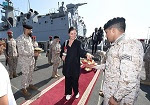According to Nikkei Asia, an emerging quadrilateral group,
between the United States, Japan, Australia and the Philippines, has become the
core of Washington's foreign security policy in the Indo-Pacific, quickly
overtaking the Quad in priority.
US
Defense Secretary Lloyd Austin held a series of meetings in Hawaii with his
counterparts from the three countries last Thursday to set an "ambitious
course" for peace, stability and deterrence in the Indo-Pacific. The
four-way alliance has reportedly been nicknamed the "Squad" by
Pentagon officials.
The four nations have held maritime military drills in April
and are expected to hold more later this year.
Ashley Tellis, a senior fellow at the Carnegie Endowment for
International Peace, said the Quad, a gathering of the US, Japan, India and
Australia, has "an appearance of slippage" due to scheduling problems
caused by the elections in India, an upcoming one in the U.S., and the wars in
Europe and the Middle East.
But Tellis said these developments have put the role of the
Quad in perspective.
"Where balancing China is concerned, the Quad is only
one arrow among many in the US quiver," he said. "It has its greatest
value in peacetime.
"In militarized crises and conflict with China, the
minilaterals like AUKUS and the 'Squad', and most importantly, the US-Japan
alliance will prove to be far more important than the Quad," he said.
"That is not to denigrate the Quad. It is simply
underscoring a strategic fact of life," the former special assistant to
President George W. Bush added.
Dhruva Jaishankar, executive director of the Observer
Research Foundation America, said the newfound attention on the Squad grouping
comes at a time when China has fired water cannons at Philippine supply ships
in the South China Sea to prevent delivery of construction materials to the BRP
Sierra Madre, a World War II-era ship grounded on the Second Thomas Shoal to
bolster Manila's sovereignty.
"That's really where China's applying the greatest
pressure at this time, even more than Taiwan, and it's really a test of the US
alliance," Jaishankar said.
China's Foreign Ministry spokesperson has previously said
the water cannon firings were a response to the ships intruding "without
China's permission" and a "serious infringement" on Chinese
sovereignty
New Delhi had hoped to convene a Quad summit earlier in the
year, to coincide with a possible visit by US President Joe Biden visit to
India in January, but the US leader was unable to make it citing a tight
schedule.
India also explored a Quad summit before the Indian
elections that began on April 19, according to Jaishankar. That too was
thwarted by Biden's March 07 State of the Union address and Japanese Prime
Minister Fumio Kishdia's state-level visit to the US on April 10.
"Clearly the triangle of the US, Japan and Australia is
far more important," said Kent Calder, director of the Edwin O. Reischauer
Center for East Asian Studies at the Johns Hopkins School of Advanced
International Studies, adding that "a series of strategic triangles
(including the U.S., Japan and South Korea, and the US, Japan and Philippines)
are really the core of US foreign policy now."
The professor noted that all of these strategic triangles
have clear functional purposes. The Biden administration is "too busy for
more talk shops," he said. "The Quad under current circumstances does
have that problem."
But Lisa Curtis, director of the Indo-Pacific Security
Program at the Center for a New American Security, said the Squad is not a
"replacement" for the Quad and should rather be seen as a supplement.
"India is an important part of the US Indo-Pacific
strategy. It's a critical part," she said.
"In the event that there's any kind of conflict or
crisis, either in the Taiwan Strait or the South China Sea, India will play a
critical role in keeping an eye on the Indian Ocean region and the Malacca
Strait," she said.
The difference between the Quad and the Squad is the
presence of the word "deterrence." Despite its formal name of
Quadrilateral Security Dialogue, the Quad has stayed away from security issues.
Joint statements issued after the past three Quad leaders
summits have included references of "peace" and "stability"
of the region but has never spoken about deterrence.
This is out of consideration for India, who has had a
tradition of non-alignment, more recently known as strategic autonomy.






